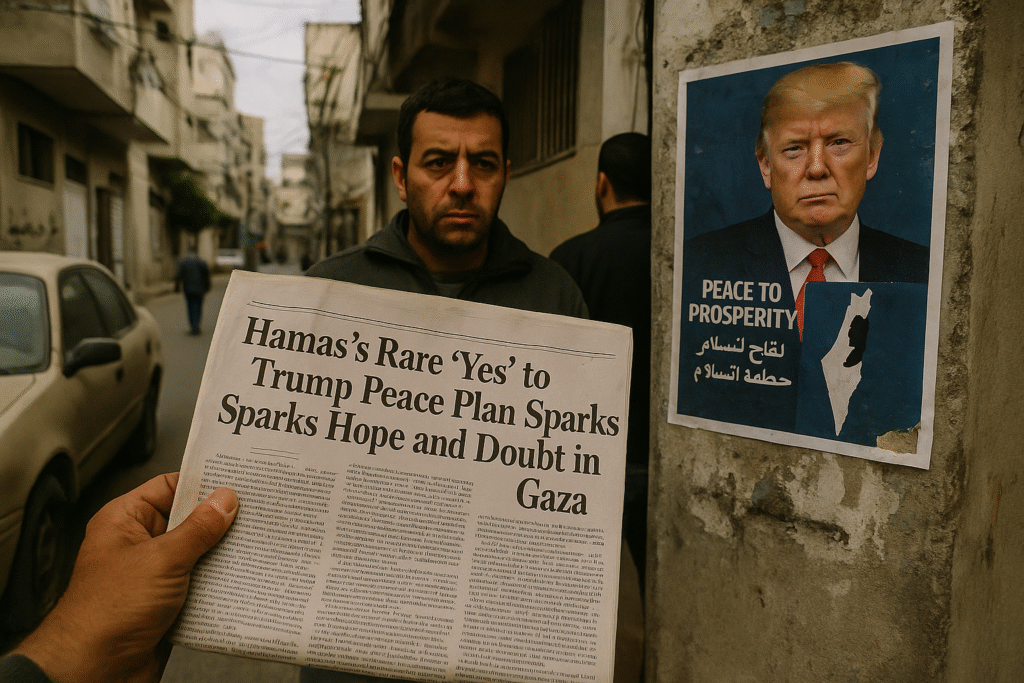By Harshit | October 4, 2025 | Gaza City | 8:00 AM EEST
A Shift in Tone from Hamas
In a dramatic turn of events, Hamas has issued a carefully worded response to U.S. President Donald Trump’s proposed peace framework, sending shockwaves through Gaza and across the region. For the first time since the conflict began two years ago, the militant group stopped short of rejecting a U.S.-backed initiative outright and instead issued what many Palestinians describe as a rare and calculated “yes.”
The statement, widely believed to have been drafted with input from mediators, accepted several elements of the Trump plan, including the release of hostages, an end to the war, and a potential transfer of authority to a broader Palestinian government. While the group left room for negotiations on key points, the tone was markedly different from the outright rejections of the past.
Local Reactions: Between Relief and Skepticism
On the ground in Gaza, the announcement sparked both relief and suspicion. “Has the war ended? Is this a dream or reality?” were the questions flooding social media feeds within hours of Hamas’s response. Many residents dared to express cautious optimism after enduring 729 days of bombardment, displacement, and loss.
But doubts linger. “Don’t get carried away by optimism,” said Gaza resident Ibrahim Fares. “The devil is always in the details. God willing it goes forward, but we must be patient.” Others feared the decision was a strategic trap, allowing Israel to secure the return of hostages only to resume military operations.
A Carefully Crafted Message
Analysts and activists noted the unusually direct tone of Hamas’s reply. “This time it was ‘yes’ without the usual ‘but’ immediately after,” wrote Palestinian commentator Mahmoud Daher on Facebook. “They said yes to prisoner release, yes to ending the war, yes to handing power to a Palestinian authority. The ‘buts’ came only later.”
Critics, however, viewed the move as political survival. “This was about Hamas staying in power,” said Gaza-based activist Khalil Abu Shammala, a long-time critic of the group. “I doubt Hamas even wrote the statement themselves—it was too clever.”
Families of Hostages Speak Out
The families of Israeli hostages responded with measured hope. Efrat Machikawa, whose relatives were kidnapped during the October 7 attack in 2023, told the BBC, “We are so fed up of the war, we want every single hostage home. This is the greatest advancement in a very long time.”
Former hostage Eli Sharabi, who discovered after 491 days in captivity that his wife and daughters had been killed in the initial Hamas assault, urged President Trump to “finish the job” and ensure the safe return of all remaining captives.
Renewed Negotiations on the Horizon
Israeli media reported Thursday that negotiating teams have been instructed to prepare to resume talks immediately, though the location remains undisclosed. Mediators are expected to play a central role in shaping the next steps of Trump’s 20-point peace framework.
At the same time, the situation on the ground remains perilous. Israeli forces carried out at least three airstrikes in Gaza City on Thursday, killing one and injuring several others, according to medical officials at al-Shifa Hospital. The Israel Defense Forces (IDF) warned that Gaza City “remains a dangerous combat zone” and urged residents to move south, even as aid agencies said southern shelters were overcrowded and unlivable.
Hamas’s Allies Signal Support
The Palestinian Islamic Jihad (PIJ), an armed group allied with Hamas, endorsed Hamas’s reply to the Trump plan, signaling a rare alignment among Palestinian factions. “The response provided by Hamas represents the stance of the Palestinian resistance forces,” the PIJ said in a statement, confirming their involvement in drafting the response.
The Road Ahead
While Hamas’s decision to say “yes” marks a significant rhetorical shift, whether it translates into lasting peace remains deeply uncertain. Optimism coexists with fear, as Gazans weigh the possibility of an end to years of destruction against the suspicion of another cycle of war.
For many, the moment reflects both desperation and fragile hope. “We have been humbled and broken by this war,” said one Gaza shopkeeper. “If there is even a small chance this plan can bring peace, we must try.”
As negotiations prepare to resume, all eyes turn to Jerusalem, Washington, and Gaza City, where the next moves could determine whether Trump’s peace plan becomes a genuine turning point—or just another false dawn in the decades-long conflict.

